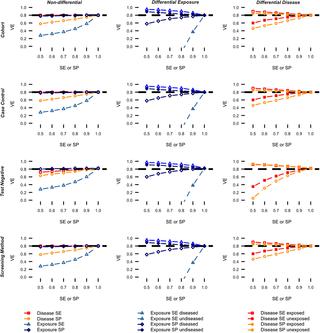PLOS ONE ( IF 2.9 ) Pub Date : 2018-06-15 , DOI: 10.1371/journal.pone.0199180 Tom De Smedt , Elizabeth Merrall , Denis Macina , Silvia Perez-Vilar , Nick Andrews , Kaatje Bollaerts

|
Background
Studies of vaccine effectiveness (VE) rely on accurate identification of vaccination and cases of vaccine-preventable disease. In practice, diagnostic tests, clinical case definitions and vaccination records often present inaccuracies, leading to biased VE estimates. Previous studies investigated the impact of non-differential disease misclassification on VE estimation.
Methods
We explored, through simulation, the impact of non-differential and differential disease- and exposure misclassification when estimating VE using cohort, case-control, test-negative case-control and case-cohort designs. The impact of misclassification on the estimated VE is demonstrated for VE studies on childhood seasonal influenza and pertussis vaccination. We additionally developed a web-application graphically presenting bias for user-selected parameters.
Results
Depending on the scenario, the misclassification parameters had differing impacts. Decreased exposure specificity had greatest impact for influenza VE estimation when vaccination coverage was low. Decreased exposure sensitivity had greatest impact for pertussis VE estimation for which high vaccination coverage is typically achieved. The impact of the exposure misclassification parameters was found to be more noticeable than that of the disease misclassification parameters. When misclassification is limited, all study designs perform equally. In case of substantial (differential) disease misclassification, the test-negative design performs worse.
Conclusions
Misclassification can lead to significant bias in VE estimates and its impact strongly depends on the scenario. We developed a web-application for assessing the potential (joint) impact of possibly differential disease- and exposure misclassification that can be modified by users to their own study scenario. Our results and the simulation tool may be used to guide better design, conduct and interpretation of future VE studies.
中文翻译:

疫苗有效性研究中由于差异和非差异性疾病和接触分类错误造成的偏见
背景
疫苗效力(VE)的研究依赖于对疫苗接种和疫苗可预防疾病病例的准确识别。在实践中,诊断测试,临床病例定义和疫苗接种记录通常会出现误差,导致VE估算值出现偏差。先前的研究调查了非差异性疾病分类错误对VE估计的影响。
方法
我们通过模拟探索了使用人群,病例对照,阴性试验病例对照和病例组设计估算VE时非差异性和差异性疾病和暴露分类错误的影响。关于儿童期季节性流感和百日咳疫苗接种的VE研究证明了错误分类对估计VE的影响。我们还开发了一个Web应用程序,以图形方式显示用户选择的参数的偏差。
结果
根据情况,错误分类参数会产生不同的影响。当疫苗接种率较低时,暴露特异性的降低对流感VE估计的影响最大。暴露敏感性的降低对百日咳VE评估的影响最大,因为百日咳VE评估通常可实现较高的疫苗接种覆盖率。发现暴露错误分类参数的影响比疾病错误分类参数的影响更明显。当错误分类受到限制时,所有研究设计的性能均相同。在重大(差异)疾病分类错误的情况下,测试阴性设计的效果会更差。
结论
错误分类会导致VE估计值出现重大偏差,其影响在很大程度上取决于场景。我们开发了一个网络应用程序,用于评估可能不同的疾病和暴露分类错误的潜在(联合)影响,用户可以根据自己的研究场景进行修改。我们的结果和模拟工具可用于指导更好的设计,进行和解释未来的VE研究。











































 京公网安备 11010802027423号
京公网安备 11010802027423号